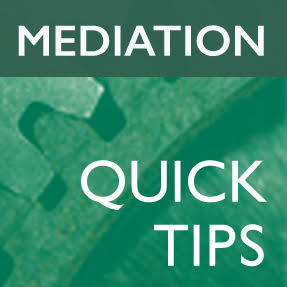
Welcome to this ‘Mediation Quick Tips’ Newsletter Issue 22
Safe Challenging Questions – Neuro Linguistic Programming
Use Neuro Linguistic Programming (NLP) Representational Systems When Asking Questions
For more comprehensive information on NLP:
‘The Mediator’s Toolkit: Formulating and Asking Questions for Successful Outcomes’, Chapter 11: Neuro Linguistic Programming Questions
Richard Bandler and John Grinder, the co-founders of NLP, state that we absorb information and represent it to our brain through the channels of our five senses. These channels are known as representational systems. As noted in Chapter 2 of The Mediator’s Toolkit: Formulating and Asking Questions for Successful Outcomes, these channels that absorb information are visual (images), auditory (sounds), kinaesthetic (touch and internal feelings) and, to a lesser extent, gustatory (tastes) and olfactory (smells).
Bandler and Grinder claim that each person has a more highly valued or preferred representational system in which they vividly create an experience in their brain and each person tends to use that specific representational system in their communication more often than their other representational systems.
When mediators listen to the surface level of language and communication that presents at mediation, they need to note the representational system parties use when communicating their experience. Then mediators need to use that same representational language when reflecting back what parties say, prior to asking questions of them.
NOTE!
The 2nd Edition of ‘The Mediator’s Toolkit: Formulating and Asking Questions for Successful Outcomes’, published 10th June 2025 can be ordered on amazon.com or waterstones.com or on amazon.co.uk and other well known websites.
Next O’Sullivan Solutions online advanced mediation courses:
October 9, 10, 16, 17 – 2025
February 5, 6, 12, 13 – 2026
Time Schedule for all advanced mediation courses:
Irish Standard Time: / GMT: 1.30pm -5.30pm
Four half days – Live zoom course
advanced level mediator training
Party’s Preferred Representational Stance
Visual:
I can see you are delighted with the project. How do you think other people are viewing it?
Auditory:
It sounds to me that you are pleased with the project? What are the things you have been hearing about it?
Kinaesthetic:
I sense you feel a very heavy burden on you since this happened? What would help you in lifting that heavy burden? What supports from the organisation might you need?
Olfactory:
You say you smell something fishy about this project – what exactly is that smell telling you?
Gustatory:
You say that you can taste the victory? What do you most relish about it?
For communication between parties to be effective, mediators need to be certain that a party hears a message as it was intended by the sender, the other party. If one party is using visual references and the other party is auditory, they may have mismatched communications. A mediator needs to reflect back to the party who uses this representational system using visual references, and then ask a question of the other party using the auditory representational system.
Doing this will create a safer and easier environment for asking questions and discussing issues.
Next Newsletter
This newsletter will focus on the Concept of Risk (Loss) Aversion when posing a question as it can make the difference between a party accepting or rejecting an offer.
NOTE!
The 2nd Edition of ‘The Mediator’s Toolkit: Formulating and Asking Questions for Successful Outcomes’, published 10th June 2025 can be ordered on amazon.com or waterstones.com or on amazon.co.uk and other well known websites.
Next O’Sullivan Solutions online advanced mediation courses:
October 9, 10, 16, 17 – 2025
February 5, 6, 12, 13 – 2026
Time Schedule for all advanced mediation courses:
Irish Standard Time: / GMT: 1.30pm -5.30pm
Four half days – Live zoom course
advanced level mediator training



